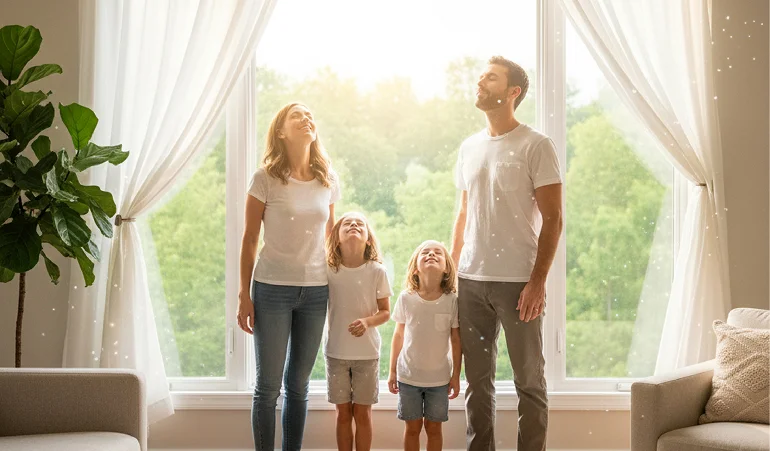Contact Info

Indoor air quality is a major concern across Pennsylvania homes. Not limited to comfort only, it is also associated with significant health concerns. With a highly fluctuating climate in various regions, maintaining a healthy indoor environment is compulsory for every homeowner. This guide will explore the common challenges, best practices, solutions, and regular maintenance tips to keep the homes well-ventilated with fresh air.
Radon is one of the primary concerns for compromised air quality. In Pennsylvania, Radon levels are relatively higher than in many other states. This hazardous gas often seeps through the cracks and drafts in the walls and gets access to crawl spaces and basements.
Many components, including household paints, cleaning agents, and construction chemicals, release volatile compounds slowly. If the home is sealed entirely, these chemicals cannot escape and contribute to low air quality inside.
Mold is often seen, especially in poorly insulated basements. It grows in damp places and may be due to condensation in winter.
In springs and falls, pollens and allergens pose a significant health threat in Pennsylvania. They can easily build up indoors if there is no effective way of air filtration.
Smoke is often due to culinary practices, fire, or combustion devices. It leads to the presence of fine particulate matter inside that is risky for lung health.
The Pennsylvania Energy Code complies with both national and local standards. Every home must have a proper ventilation system to bring in fresh air inside and to exhaust stale air outside.
Municipalities in many regions, like Lehigh, Northampton, Allentown, and Bethlehem, often require permits for installing new IAQ equipment or replacing an older one. The inspectors conduct a site survey and check for code compliance.
Multiple ventilation methods are in practice in Pennsylvania including exhaust fans, balanced systems like HRVs or ERVs, and supply fans, and supply fans, etc. In areas with snowy winters and humid summers, balanced systems are often considered as a top choice.
Use the filters with high MERV ratings that fit your equipment needs. Generally, whole-house filtration systems capture more pollutants than standard filters. Air purifiers can be used in bedrooms or where you suspect the presence of allergens.
The two effective ventilation systems are heat recovery ventilators (HRVs) and energy recovery ventilators (ERVs). Both of them bring fresh air inside without causing significant energy loss. Exhaust fans that are installed in bathrooms, kitchens, and other areas also play a role in eliminating humidity and foul odors.
In summer, dehumidifiers are the best choice to prevent mold and mildew growth. In winter, however, humidifiers are often used to protect wooden elements, maintaining comfort at the same time. They must be used carefully to prevent the risk of condensation.
Radon testing is the first approach to check current levels of Radon gas. If the levels exceed the safe limits, use mitigation systems like sub-slab depressurization to decrease the risk. Sealing the cracks in foundations and improving ventilation also helps in reducing the levels to a safe range.
Numerous utilities offer rebates for air purifiers, dehumidifiers, ventilation fans, and residential HVAC solutions in PA. Especially, electric utilities are most common in this regard.
For qualified HVAC and ventilation upgrades, numerous tax credits under the Inflation Reduction Act cover the costs to some extent. Many of the home electrification and appliance rebate programs are also in practice.
Lehigh HVAC offers GreenSky financing and flexible monthly installments. Accompanied by rebates, financing, and incentives, it helps you reduce upfront costs for HVAC upgrades in Pennsylvania.
Changing HVAC filters is recommended ideally after every one to three months. The frequency, however, depends on the quality, usage, and specifications.
Service both humidifiers and dehumidifiers at the end of each respective season.
Check ductwork every few years, especially in older PA homes. While inspecting, look for leaks, buildup, and obstructions.
Install exhaust fans, especially in kitchens and bathrooms, to remove moisture and pollutants. Run these fans every time you use these areas for effective ventilation.
Inspect the radon levels every few years or after a renovation.
Schedule professional HVAC tune-ups before the cooling and heating seasons start.
Indoor air quality matters a lot for year-round comfort in Pennsylvania homes. Reducing radon levels, upgrading filtration, eliminating moisture, and ensuring proper ventilation are key factors for healthy indoor air quality. Rebates, tax credits, financing options, and energy incentives often make improvements more affordable for certain qualified systems.
Lehigh HVAC provides climate-compatible installs, ongoing support, and easy financing options to maintain healthy air in every PA home. Contact us today for a free indoor air quality assessment in Lehigh Valley, Allentown, Bethlehem, and surrounding areas.